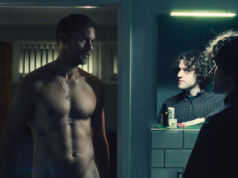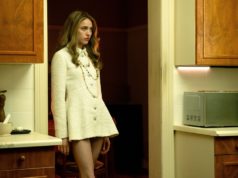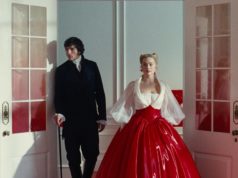The biography Winnie Mandela was made back in 2010, but it’s probably coming to local theaters now because Nelson Mandela is approaching the end of his life. (The great leader is getting his own biographical film later this year.) It’s also coming to us because it stars American actors who are recognizable to our audiences, even though South Africans understandably complained about the casting when this film was made. Despite all that, this dully conventional biopic remains a good deal less compelling than the history that inspires it.
Jennifer Hudson stars as Nomzamo Winfreda Madikizela, born in 1936 as the sixth daughter of a schoolteacher who desperately wants a son. The story follows her through her schooling in Johannesburg as a social worker; her romance with charismatic, passionate lawyer and social activist Nelson Mandela (Terrence Howard); her taking up of his anti-apartheid cause after his imprisonment; her own prison term and psychological torture at the hands of South Africa’s police state; and her travails after her nation becomes a free democratic society.
The above events encompass five decades, and so much of it gets elided that it amounts to South African history for those who have only an hour and 40 minutes to spare on the subject. Yawning gaps open up in the story: Only a few minutes after Winnie is appalled at South African blacks killing suspected collaborators by “necklacing,” there she is endorsing the same practice. The movie might have improved its focus by exploring what it took for the Mandelas to maintain their marriage through 27 years of enforced separation, but writer-director Darrell Roodt shows little interest in this aspect of the story. In fact, the only time the film gains much traction is when it’s forced to slow down during Winnie’s protracted solitary confinement. Hudson (whose African accent is shaky in this movie) does much better with the scenes here than elsewhere, and the film progresses from Winnie holding conversations with ants in her cell to figuring out how to inflict her own form of punishment on her jailers.
The movie does address Winnie Mandela’s culpability in the murder of Stompie Moeketsie, a 14-year-old member of her private security team who was beaten to death by other team members who suspected him of informing on them to the police. However, the reality of Mandela’s involvement was even grubbier than the film depicts. The movie is silent, too, on her 2009 fraud conviction. Late in the film, when Winnie is called before the Truth and Reconciliation Committee, the commissioners call her “a polished liar,” but we haven’t seen that side of her. We get no sense of the main character’s moral decline or of her devious side coexisting with her passion for justice. Instead, the movie spends much of its first hour or so telling a heroine’s story and then takes an abrupt U-turn. I suspect that there are legal reasons for all this fudging; Winnie Mandela is still alive and active in South African politics. Yet knowing that doesn’t make this movie any better. The real Mandela is a compromised and complex historical figure, and the movie isn’t equipped to handle the contradictions of this woman who helped free her country from apartheid but went to unpardonable extremes to do it.
The outline of this plot is that of a historical tragedy, of someone who made her nation a fairer and better land only to find herself with no place in it. Winnie Mandela fails to tell this story, but it mirrors the plight of the filmmaker. The experienced Roodt directed two films about South Africa in the mid-1990s (the musical Sarafina! and the literary adaptation Cry, the Beloved Country), but like many South African artists of his generation, the fall of apartheid seems to have left him searching for subject matter. Meanwhile, he has been effectively left behind by more cosmopolitan filmmakers like Neill Blomkamp, who have helped turn their country’s film industry into the most innovative one on the continent. The story of this generation of South Africans, forged in the fires of racial violence and now struggling to come to terms with a new world, has yet to be told.
[box_info]
Winnie Mandela
Starring Jennifer Hudson and Terrence Howard. Written and directed by Darrell Roodt, based on Anne Marie Dupreez Bezrob’s biography. Rated PG-13.
[/box_info]












